Last Updated on March 15, 2022
Almost every motorist understands the true value of a properly functioning brake system. However, few are as keenly aware of this as those that have been left to contend with brake failure of any type, while in the midst of day-to-day travel.
We all too often take proper brake operation for granted. After all, it seems only natural for our vehicle to come to a smooth, concise stop with little more than a second thought when we depress the brake pedal.
However, brake-related issues do arise on occasion. Of these issues, unexpected brake lock-up can be especially concerning. When a vehicle’s brakes suddenly lock up and do not appear to be releasing, a number of more serious issues can occur.
Read on to learn more about the causes of a vehicle’s brakes locking up while driving, as well as what can be done to remedy such concerns.
Related: Common Causes of Spongy Brakes
What Does it Mean When Your Brakes “Lock Up”?
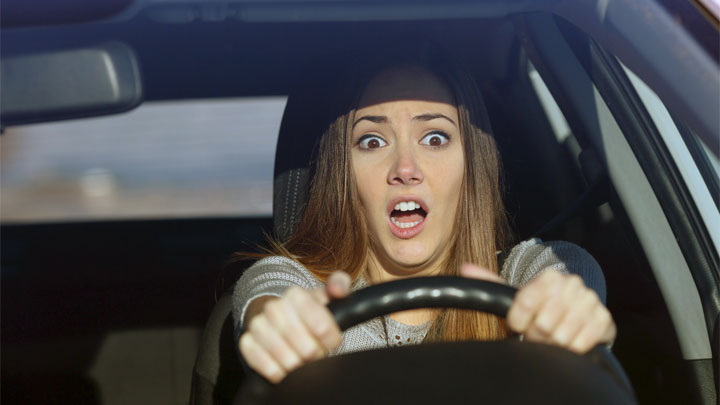
Brake “lock-up” can be most simply defined as any situation in which a vehicle’s brakes are applied, but do not release as expected. This is a serious situation, in any event, but can be especially dire when it occurs while driving. In the most serious of cases, a wreck may take place as a result.
Contrary to popular belief, brake lock-up does not always mean that a vehicle’s brakes have remained clamped to the point of causing full-wheel lock-up.
By definition, the term brake lock-up can be used to describe any situation in which a vehicle’s brakes do not return to their “rest” position following a pedal application.
What Can Cause Brakes to Lock Up?
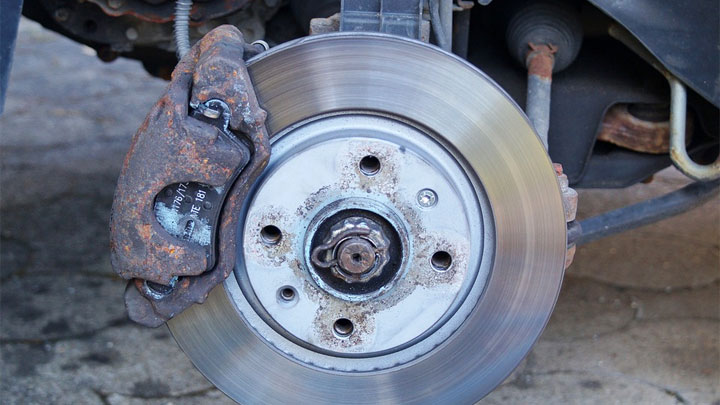
Though brake lock-up is nowhere near as prevalent as it was in the days prior to the use of modern ABS brakes, such issues do still occur on occasion. The vast majority of these issues are caused by substantially worn or otherwise compromised, brake system components.
The following are the most common causes of a vehicle’s brakes locking up while driving.
- Use of improper brake fluid
- Overheated brake system components
- Damaged or exceedingly worn brake pads, calipers, and rotors
- Damaged or exceedingly worn brake drums, shoes, and wheel cylinders
- Accidentally engaging the emergency brake
- Seized/stuck brake caliper or wheel cylinder
See Also: 3 Reasons Your Brake Lights Won’t Turn Off
What To Do When Your Brakes Lock Up While Driving
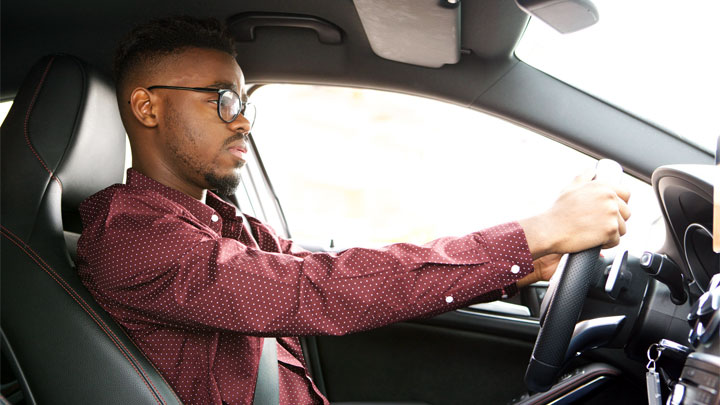
Experiencing brake lock-up while driving can be a harrowing ordeal. However, there are several key steps that should be followed to prevent a bad situation from becoming much worse. These steps are as follows.
#1 – Do Not Panic
The single most important thing to remember when experiencing brake lock-up is that it is imperative not to panic.
While this certainly sounds easier said than done, you also carry the responsibility of doing everything within your power to protect your passengers, as well as the other motorists around you.
Panicking robs you of your ability to think through the additional steps to follow.
#2 – Find a Place to Stop
The next item of consideration pertains to locating a safe place to come to a stop. Quickly scan your surroundings to determine what is at your disposal.
Parking lots, wide driveways, or even an empty shoulder make suitable locations for this purpose.
#3 – Carefully Exit the Roadway
Once you have determined the point at which you intend to stop, exit the roadway as carefully as possible. Though somewhat difficult to do at the moment, take into consideration all traffic that surrounds you.
If you must merge across lanes, signal if at all possible. Remember, poor decision-making at this point can lead to a much more dire situation.
#4 – Come to a Stop, Set E-Brake if Necessary
After pulling from the roadway, bring your vehicle to a stop as carefully as possible. If your vehicle appears to be pulling to one side or the other, setting your emergency brake can provide a certain level of stabilization.
However, it is important to remember that setting a vehicle’s emergency brake at a high rate of speed can pose its own hazards.
Related: E-Brake Stuck? (Causes and What To Do)
#5 – Have the Vehicle Towed For Repair
After experiencing brake lock-up, a vehicle should not be driven under any circumstances, until proper repairs have been made. A vehicle should be towed to its intended point of repair, even if this location is only a short distance away.
How to Fix Locked Up Brakes
Following an incident of brake lock-up, it is imperative to determine the root cause of such a failure. Doing so often comes down to a matter of conducting a thorough visual inspection.
A vehicle’s front and rear brakes should be inspected for signs of irregular wear, as well as component damage. Any deficiencies discovered during this inspection should be repaired prior to returning the affected vehicle to service.
In many cases, the offending brake assembly can be identified by a burnt smell, the presence of excess brake dust, or the blueing of the assembly’s corresponding brake rotor or drum. If any signs of this nature are discovered, all brake components at that wheel end should be replaced.
Additionally, one might also wish to replace the same components at the opposite wheel end of the same given axle. At the very least, brake pads of a single axle should always be replaced in pairs.
In extreme cases, overheating as the result of brake lock-up can actually compromise the wheel bearing of the affected wheel end. When this occurs, subsequent replacement becomes necessary.
After all the repairs have been made, an initial brake test should be conducted in an isolated location, such as a parking lot or driveway, whenever possible.
If all appears to be in proper operating condition, a more thorough test drive can be conducted on a nearby roadway. If at any time, further additional issues become apparent, discontinue your test drive for further evaluation.
If for whatever reason, you are unsure about repairing your vehicle’s brakes following an occurrence of lock-up, seek professional advice. There is no shame in seeking out a second opinion, or opting for professional repair.
After all, your life is quite literally riding on the functionality of your vehicle’s brake system.

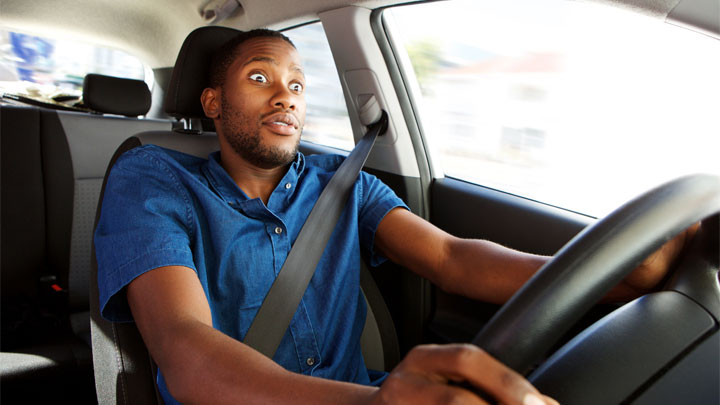
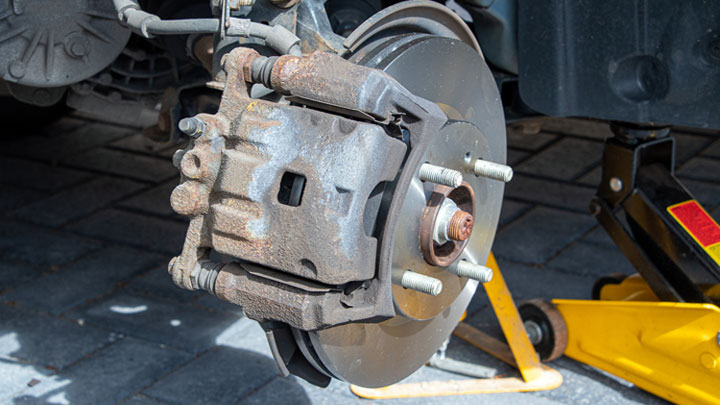
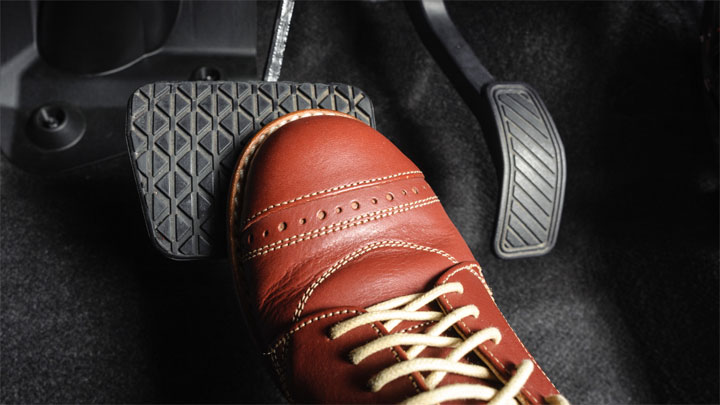
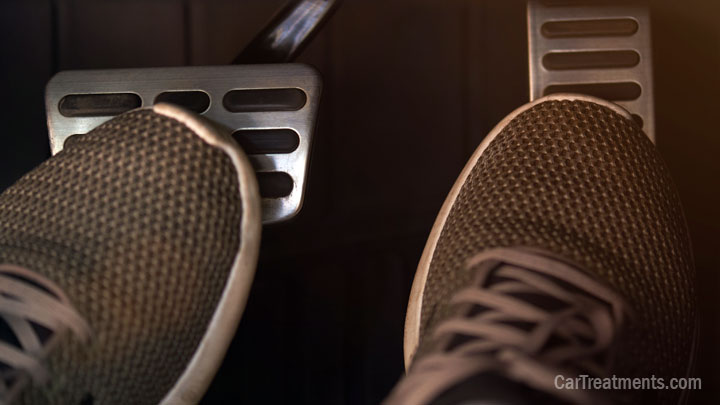
Changed disc, pads. Rebuilt calipers pistons. Replaced boots etc. Still lock after applying brakes under normal conditions. Fluid changed. Fexi and brake lines all OK. Completely bewildered. It’s like brake fluid pressure only builds up ie stiff pedal. But isn’t easing off after easing off on pedal. Appreciate suggestion.
What brake pads did you put on there? Is there any chance the torque of the pads could be overwhelming the tires you have on the vehicle? Old, hard tires could do this, or really aggressive pads with a lot of bite.
I am having the same problem, did you end up finding what the problem was?
Have a 1954 chevy with a mustang kit front disc brakes and drums in rear power booster with poportion valve disc in front drums rear replace the portion valve twic but front brakes still locking up
I panicked when I slammed on the brakes, but the brakes didn’t slow me down much and the brakes squealed strangely. But luckily I’m slow and can handle it. Right after that, I called someone to come and check my brakes for damage. The mechanic told me that my car had a problem with the anti-lock braking system. My ABS braking system was flickering. The car dashboard indicates a system malfunction.
He said he was lucky to have spotted it in time and taken it in for repairs soon.
Thank you for this useful information. I think everyone who drives a car should read this useful and accurate information. I hope you will publish many more good articles in the future.